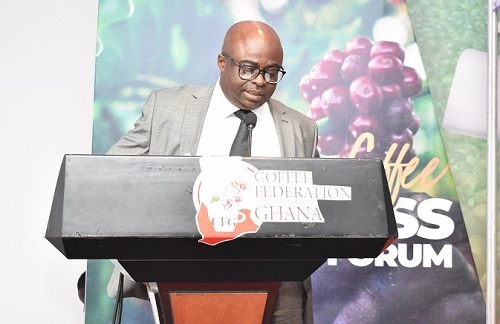Climate change and deforestation are putting more than half the world’s wild coffee species at risk of extinction, including the popular commercial coffees Arabica and Robusta, Deputy CEO of Cocobod-in Charge of Agronomy and Quality Control, Dr. Emmanuel Dwomoh, has said.
It is in this light that African coffee producers have been cautioned to adopt climate-smart options in their day-day farming activities to ensure improved yields as well as prevent harm to the environment.
Speaking at the opening of the 7th General Assembly and 5th Scientific Colloquium of the Agency of Coffee Robusta of Africa and Madagascar (ACRAM), Dr. Dwomoh, underscored the need for climate-smart options.
“We have to find climate-smart options to our bean production and processing, such that we can comfortably handle huge tonnages without destroying the environment,” he said.
He explained that in Ghana, for instance, Cocobod has been educating farmers to ensure that aside from the coffee plant, it is imperative to have a shade – as in planting trees alongside the coffee to give it forest cover, which will take care of the issue of climate change affecting yields.
He also indicated that there is an enabling government support with the rolling out of Planting for Export and Rural Development (PERD), which was launched in April this year with the aim of providing catalytic support to revamping six tree crops (coffee, cashew, oil palm, coconut, rubber and mango).
Furthermore, he noted that COCOBOD earlier this year began revising the Coffee Regulations of Ghana through a collaborative process with the Coffee Federation of Ghana (CFG).
This is part of efforts to reinvigorate the coffee sector in Ghana as part of our agricultural diversifying efforts, he said.
Dr. Dwomoh, also stated that with the coming into force of the African Continental Free Trade Area (ACFTA), there is huge potential for barriers to trade within the continent to be reduced – from tariffs to import quotas – thus allowing the free flow of goods and services between member-states.
On his part, the President of the Coffee Federation of Ghana (CFG), Chief Nathaniel Ebo Nsarko, indicated that so far 20,000 coffee farmers have been registered by the Federation, and added that the forum will expectedly provide solutions to unemployment affecting the youth.
Africa produces about 10 percent of the world’s coffee, and Mr.Nsarko stated: “We should leverage opportunities so Africa is not left behind”.
The President of ACRAM, Monsieur Enselme Gouthon, called on stakeholders to adopt research in their farming practices as well as focus on gender issues – particularly coffee production for women.
The forum, he said, will seek to develop and highlight prospects for coffee producers within producing countries, “so we can draw on lessons and challenges within the African coffee sub-sector”.
CFG and ACRAM in 2018 signed a Memorandum of Understanding (MoU) that enables the two organisations to cooperate and coordinate efforts, and share expertise toward the management of coffee on the African continent.
The MoU ensures that ACRAM commits to assisting CFG to secure funding for its activities.
ACRAM primarily promotes robusta coffee from Africa and Madagascar; helps in revenue improvement, livelihood enhancement for coffee farmers; and research and development of indigenous development concepts.
Source: B&FT Online





